What are the top AI tools for product managers?
Explore top AI tools that enhance product management by automating tasks, analyzing data, and improving decision-making for effective strategies.
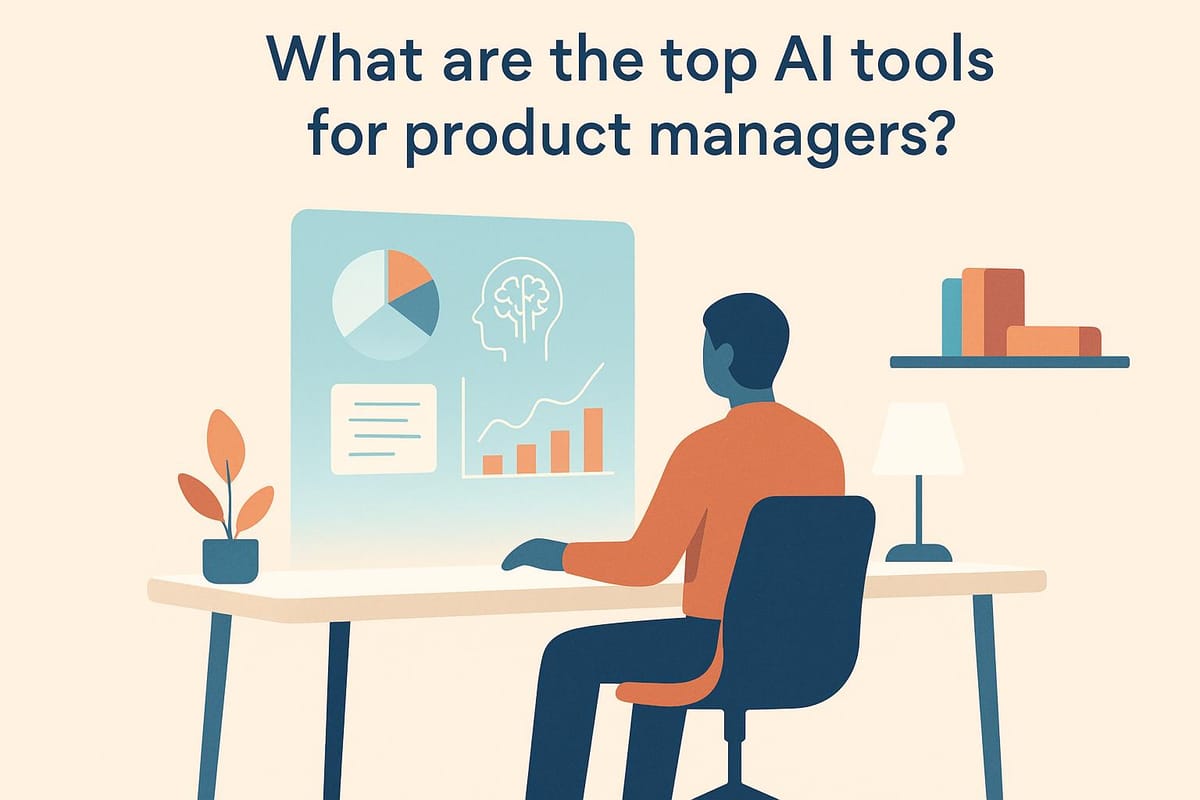
AI tools are transforming product management by automating repetitive tasks, analyzing data, and improving decision-making. Here's a quick rundown of six standout tools:
- BuildBetter.ai: Merges internal and external data, automates workflows, and saves time on analysis. Pricing starts at $400/month.
- H2O.ai: Focuses on machine learning and predictive insights for handling large datasets. Pricing available upon request.
- Dovetail: Simplifies customer feedback analysis and identifies trends. Pricing is custom-based.
- Productboard AI: Automates feedback categorization and roadmap prioritization. Plans start at $20/user/month.
- Zeda.io: Streamlines customer feedback and product discovery with AI-driven insights. Pricing starts at $59/month.
- ProdPad CoPilot: Automates workflows and offers tailored recommendations. Pricing starts at $6/user/month.
Quick Comparison
| Tool | Key Features | Pricing | Best For |
|---|---|---|---|
| BuildBetter.ai | Data integration, workflow automation | From $400/month | Teams needing data-driven insights |
| H2O.ai | Machine learning, predictive analytics | Contact sales | Large teams with complex data needs |
| Dovetail | Feedback synthesis, trend analysis | Contact sales | Research-heavy teams |
| Productboard AI | Roadmap prioritization, feedback analysis | From $20/user/month | Roadmap-focused teams |
| Zeda.io | Feedback analysis, predictive insights | From $59/month | Teams aligning products with needs |
| ProdPad CoPilot | Workflow automation, AI recommendations | From $6/user/month | Teams seeking AI-guided management |
These tools help product managers save time, boost efficiency, and focus on high-impact tasks. Choose based on your team size, budget, and specific needs.
AI for Product Managers - Top AI Tools for PMs & The Future of Product Management | HelloPM
1. BuildBetter.ai
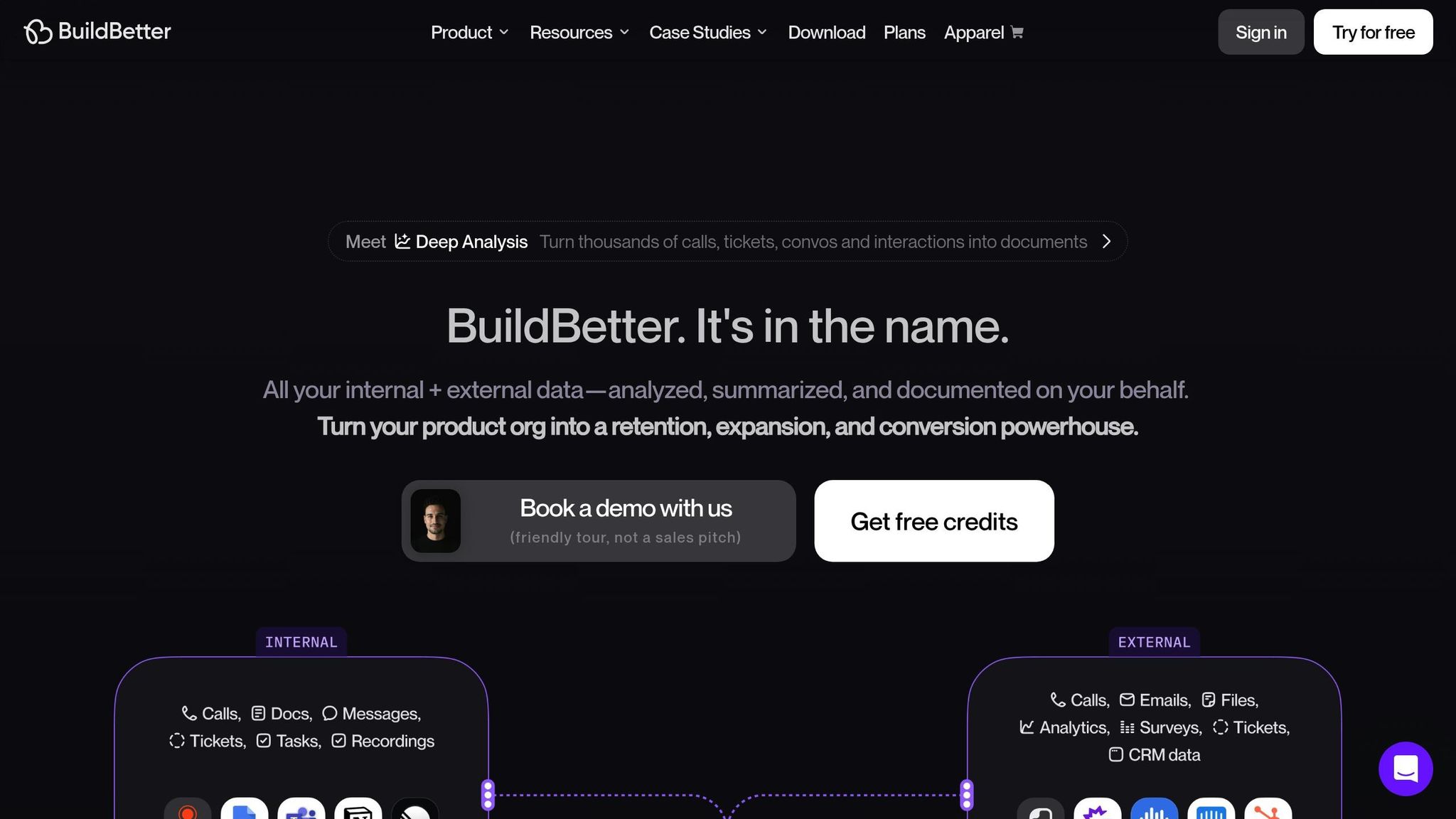
BuildBetter.ai is an AI-driven platform designed to provide B2B product teams with actionable insights. What sets it apart is its ability to merge internal team communications with external customer interactions, creating a single, unified source of truth. This approach ensures teams have a complete picture to guide their decisions.
Data Integration and Analysis Capabilities
BuildBetter.ai seamlessly connects with your existing tools, removing data silos and ensuring that no insight slips through the cracks. It integrates with over 100 tools across six major categories, making it a versatile solution for product teams.
| Integration Category | Supported Tools |
|---|---|
| Recording | Zoom, Google Meets, Webex, MS Teams, Gong, Chorus, Manual Upload |
| Ticketing | Intercom, Kustomer, Zendesk, Manual Upload |
| Documentation | Notion, Confluence, Google Docs |
| Project Management | Slack, Linear, Jira, Asana |
| CRM | HubSpot, Salesforce |
| Misc | Zapier |
What makes BuildBetter.ai unique is its ability to process both internal data - like call recordings and Slack messages - and external data, such as support tickets and customer surveys. By transforming scattered qualitative inputs into structured, research-grade documents, the platform equips product managers with the information they need to make smarter decisions. This integrated data pipeline feeds directly into advanced insights, empowering strategic planning.
AI-Powered Insights for Product Strategy
BuildBetter.ai doesn't just collect data - it turns it into searchable insights that guide product strategy. By analyzing calls, tickets, and messages, the platform helps teams zero in on critical metrics like retention, expansion, and conversion.
The impact is measurable. Teams using BuildBetter.ai report spending 43% more time on revenue-generating activities. Additionally, the platform can save up to 18 hours per project during a standard 2-week sprint, translating into an estimated $21,000 in annual savings per person (based on a $45/hour rate).
"We don't operate without BuildBetter. This is the only platform that we use religiously." - Aditya Goyal, Product Lead
By automating the creation of actionable reports and summaries, BuildBetter.ai eliminates the need for manual data analysis, giving product managers the insights they need - faster and more efficiently.
Automation of Workflows and Processes
Beyond insights, BuildBetter.ai simplifies operations by automating workflows. Its reusable workflows can run directly from your inbox on a schedule you set, taking routine tasks off your plate.
The benefits are clear:
- Cuts decision-making time by 30%
- Reduces operational workload by 40%
- Eliminates 26 meetings per month per team
- Speeds up the time from customer insight to action by 50%
"It wouldn't be possible to do my job at this scale without BuildBetter." - John Strang, Product Operations
By automating these processes, BuildBetter.ai allows product managers to concentrate on strategic priorities rather than getting bogged down by administrative tasks.
Pricing Transparency and Scalability
BuildBetter.ai offers pricing plans tailored to fit teams of all sizes, ensuring flexibility as your needs evolve. The three main options include:
- Growing Plan: $400/month
- Scaling Plan: $1,600/month
- Enterprise Plan: Custom pricing
With an impressive 98% subscription retention rate, BuildBetter.ai proves its value and commitment to customer satisfaction. The platform also prioritizes data privacy, ensuring user data isn’t used to train models and providing customizable privacy controls for recordings.
2. H2O.ai
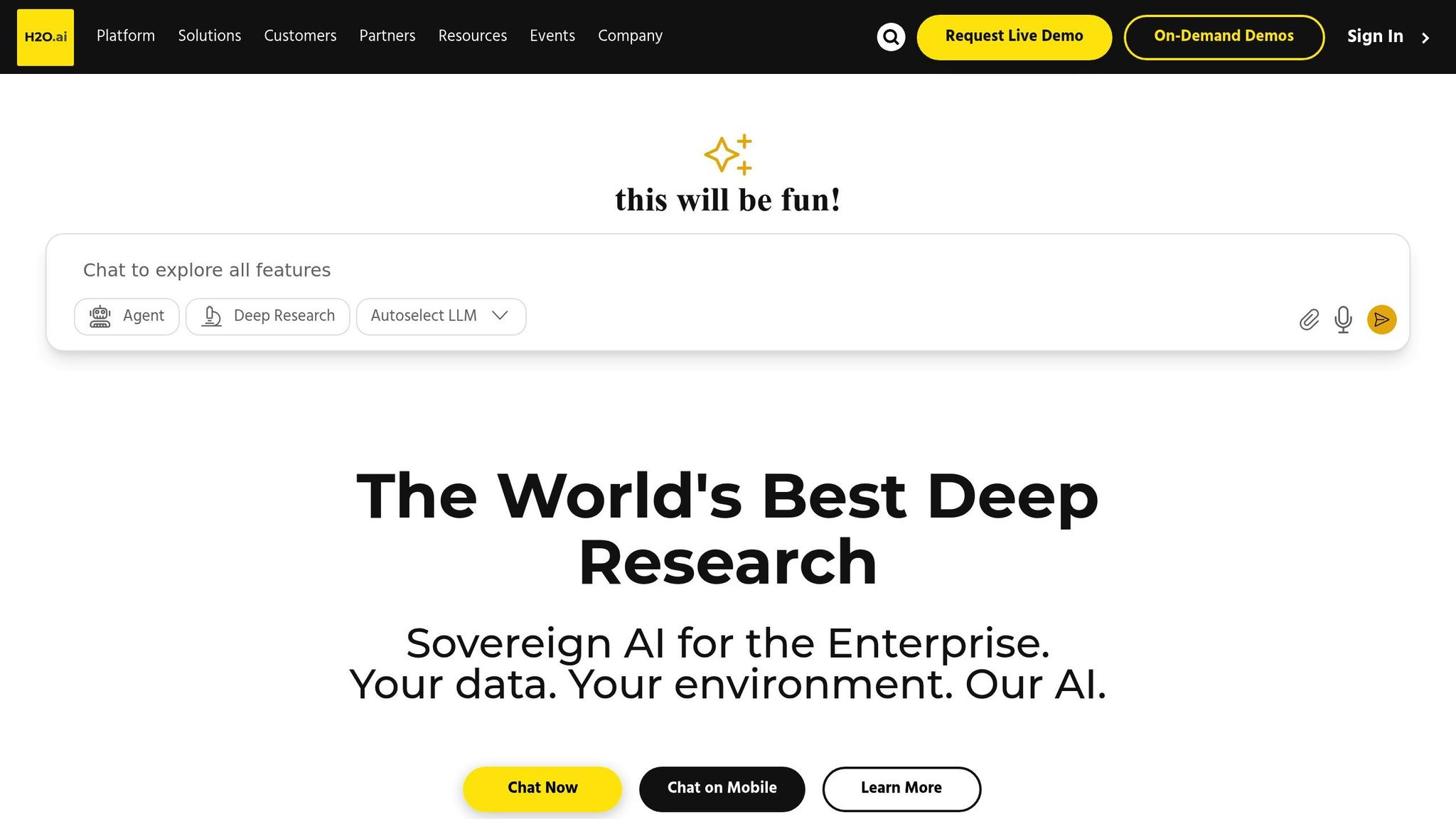
H2O.ai is a machine learning platform designed to simplify data integration and automate workflows, helping product managers make smarter decisions. With its predictive and generative AI capabilities, it’s built to address the challenges of working with complex data spread across multiple systems.
Data Integration and Analysis Capabilities
One of the biggest hurdles for product managers is dealing with fragmented data from various sources. H2O.ai solves this by creating a centralized hub that connects data from different systems, removing the hassle of digging through multiple tools for insights.
The H2O Feature Store takes this a step further. It intelligently extracts and organizes data, making feature engineering and model building more efficient by seamlessly linking data across platforms. This kind of integration is critical, especially for companies like AT&T, which handles an enormous 465 petabytes of data traffic daily across its global network.
H2O.ai supports a wide range of data types - including numeric, text, categorical, images, and date/time - in one dataset. Its automated machine learning (AutoML) tools cover the entire data science process, from data preparation to deploying models.
AT&T collaborated with H2O.ai to co-create the H2O Feature Store, ensuring it could handle massive, real-time workloads securely and efficiently. Prince Paulraj, AVP of Data Science at AT&T, highlighted its impact:
"With the H2O AI Feature Store, we're building AI solutions that are much faster, more accurate and robust in a fraction of the time."
This integration empowers teams to uncover insights that directly shape product strategies.
AI-Powered Insights for Product Strategy
H2O.ai transforms raw data into practical insights, enabling solutions like complaint summarization, pricing engines, and recommendation systems that guide critical decisions.
The results speak volumes. AIMIA, for example, achieved a 700% increase in cost savings for a campaign and an 11% boost in ROI using H2O Driverless AI. Scott Pete, AIMIA's Director of Analytics and Insights, shared how the platform improved their workflow:
"With H2O Driverless AI, we have seen improvements in the models and the results we were able to deliver for our clients. In one case we saw a 700% increase in cost savings, for a campaign costs with an 11% improvement in overall ROI. From an internal perspective, we've seen a reduction in our model development times significantly. Driverless AI allows us to tune models faster and gain insights out of the entire process."
The platform also supports marketing optimization, customer loyalty analysis, and segmentation. Additionally, product managers can customize solutions using both proprietary and open-source large language models (LLMs).
Automation of Workflows and Processes
H2O.ai streamlines complex workflows to save time and resources. With H2O MLOps, teams can deploy models using server-based REST endpoints for real-time processing.
The platform offers flexible deployment options like Single Model, A/B Testing, and Champion/Challenger configurations, giving product managers the flexibility to test and refine their strategies. This is particularly valuable when tapping into the 70% of unstructured company data that often goes unused.
Organizations are already seeing the benefits of these automated processes. North American Bancard, for instance, implemented LLM-powered applications with H2O.ai to optimize operations and streamline workflows. Jeffrey Vagg, Chief Data and Analytics Officer, praised the collaboration:
"H2O.ai consistently demonstrates a vested interest in our continued success and is ready to explore new ways to leverage LLM-powered solutions to enable greater fulfillment and productivity."
The Commonwealth Bank of Australia also partnered with H2O.ai to develop a custom GPT tailored to its customers' needs. Dan Jermyn, the bank’s Chief Decision Scientist, explained their approach:
"We have a shared vision with H2O.ai for democratizing AI responsibly and, through our partnership, we are now able to create ground-up generative AI solutions that allow us to have true control of the way we use data, techniques, and training. Responsible AI is not only a question of bias and explainability. It is also about the accountability you take: for the way you develop it and the outcomes you deliver."
Pricing Transparency and Scalability
H2O.ai takes a demo-first approach to pricing, requiring teams to request a demonstration for details. The platform can offer substantial cost savings, with query costs up to 25 times lower and document processing costs up to 100% cheaper than traditional methods. For product managers focused on ROI, these savings - combined with increased efficiency - make H2O.ai a strong choice for data-driven development.
3. Dovetail
Dovetail is making waves in product management by using automation and advanced analysis to transform customer feedback into actionable strategies. This AI-powered platform excels at turning scattered customer insights into clear, real-time guidance for product roadmaps. By combining large language models with traditional machine learning, Dovetail helps product managers uncover valuable insights from customer conversations.
Data Integration and Analysis Capabilities
Dovetail centralizes customer data by integrating seamlessly with tools like Zoom and Intercom. It automatically imports and analyzes feedback, creating a comprehensive view of the customer experience. The platform's AI quickly identifies recurring themes, use cases, pain points, and sentiment patterns - tasks that would otherwise consume hours of manual effort. With an impressive 90% transcription accuracy, it ensures reliable capture of customer conversations.
Eric Liu, Product Manager at Notion, shared how Dovetail streamlined his workflow:
"Dovetail instantly reduced my workload from 100 hours down to 10 to share our customer insights."
Similarly, Ali Moody, Senior Designer at GrandPad, noted that Dovetail's AI features cut interview processing time in half.
By consolidating data and automating analysis, Dovetail empowers teams to focus on strategic decision-making.
AI-Powered Insights for Product Strategy
At the core of Dovetail’s approach are its Magic features, designed to revolutionize product strategy. Introduced in early 2025, these advanced tools leverage Amazon Bedrock and Anthropic Claude models (including Claude 3.5 Sonnet) to enhance data analysis.
With these features, product managers and designers save an average of 10 hours weekly on analysis and improve efficiency by 80% when deriving insights. Key tools like automated summaries, thematic suggestions, Magic search, and Magic cluster make it easier to spot patterns and trends.
Emi Fogg, UX Researcher at Instawork, highlighted the benefits:
"Magic features live up to Dovetail's goal of bringing us to insight faster. While we still take every step in analyzing, synthesizing, and reviewing our research data, Dovetail's AI features like Magic search and Magic cluster have sped up the process, saving us around 1–2 hours per project, freeing up more time to focus on nuance instead of broad strokes."
The Channels product adds even more depth by analyzing feedback from multiple tools and organizing it into themes. Rody van Vianen, Senior Product Marketing Manager at PressReader, explained:
"Channels has helped us uncover important themes for improvement in customer feedback without going through tens of hours of manual analysis."
Automation of Workflows and Processes
Dovetail doesn’t just generate insights - it also simplifies workflows. Through its API, MCP server, and integrations with Teams, Slack, and Zapier, it automates feedback collection and analysis. The Channels feature continuously monitors inputs across various tools, grouping feedback into themes and organizing it by topic.
This automation is especially useful for post-release monitoring. Product teams can track feedback automatically after launches, identifying issues early without sifting through individual tickets. The system also helps detect churn risks by monitoring sentiment trends, enabling teams to address retention challenges proactively.
Nuria Tain, UX Researcher at PensionBee, shared her experience:
"Channels has quickly become a key tool, helping me spot patterns and consolidate themes across complex feedback. What used to feel impossible now takes minutes, saving hours of work."
Teams can also monitor discussions from operations, support, and compliance, addressing potential problems before they escalate and tracking how user feedback evolves over time.
Scalability and Efficiency Gains
For companies managing high volumes of customer feedback, Dovetail offers a scalable solution that dramatically reduces manual effort. Many teams report saving over 38 hours weekly thanks to its automated analysis.
Matt Hinds, Product Manager, summed up the impact:
"Being able to have a source of truth and get everyone on the same page quicker is an absolute game changer for someone like a product manager whose entire role revolves around that."
Dovetail’s AI-first approach not only accelerates insight generation but also helps teams scale their customer research efforts with ease, making it a powerful tool for modern product management.
4. Productboard AI
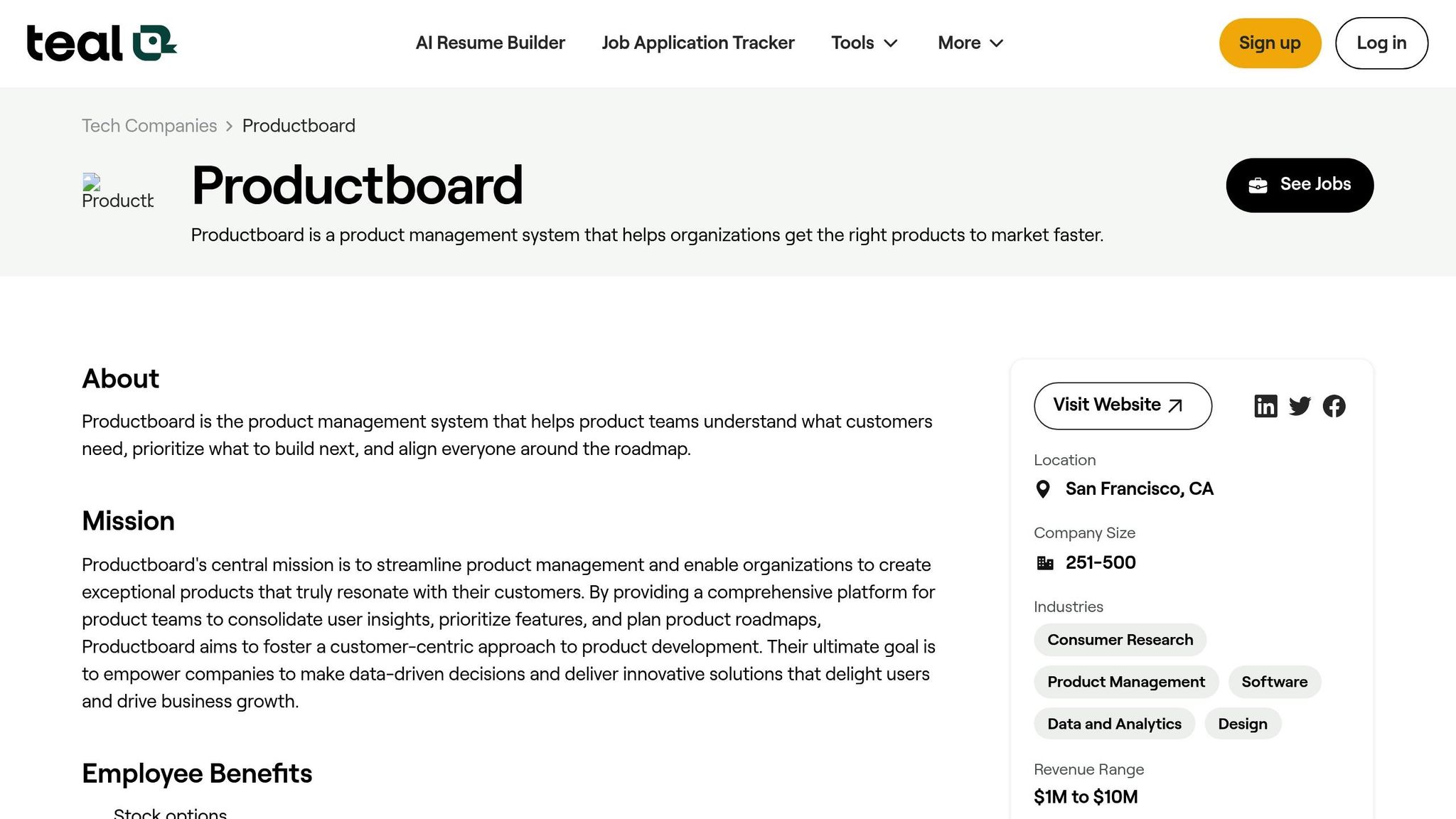
Productboard AI is reshaping the way product teams handle customer feedback and plan strategically. By blending intelligent automation with product management tools, it helps teams turn scattered feedback into actionable insights. Designed specifically for product managers, the platform uses existing customer data, feedback, roadmaps, and feature ideas to streamline decision-making and improve strategic outcomes.
Data Integration and Analysis Capabilities
One of Productboard AI's standout features is its ability to bring together diverse data sources into a single, cohesive framework for decision-making. Through Productboard Pulse, the platform integrates customer feedback from support tools, CRMs, and surveys. It then categorizes and analyzes this feedback automatically, offering a clear and unified view of customer insights, trends, and analytics.
The platform’s ability to process large volumes of feedback with precision is a game-changer. Christopher Fox, Director of Product Operations at Dashlane, shared how it transformed their workflow:
"With Productboard AI we've seen an increase in our processing rate of notes jump from only 50% to remaining steady at above 80%. And for those notes we process, we see the same 30% improvement for how many of those are getting linked to Productboard features in our backlog, which helps us increase our confidence in our prioritization and overall strategy."
This example highlights how AI can replace time-consuming manual tasks with scalable, efficient processes. By consolidating data from multiple sources, teams gain a clearer understanding of user needs, behaviors, and market trends, allowing for more informed decision-making.
AI-Powered Insights for Product Strategy
Productboard AI equips product managers with tools that accelerate strategic planning. Features such as AI-generated specs, feedback summaries, AI-driven searches, and pattern recognition help teams quickly identify trends and customer priorities. These capabilities uncover insights that might otherwise go unnoticed using traditional methods.
The AI taps into existing feedback and customer requests to jumpstart feature specifications. It also identifies trending topics, enabling teams to extract key insights from emails, support conversations, and messaging threads without the need for hours of manual analysis. Iiro Nurmi, Product Operation Manager at Smartly, explained how this has improved efficiency:
"With Productboard AI we can summarize insights instantly and find new patterns from the feedback easily, rather than summarizing each note manually. This process can be used to summarize hundreds of notes at the same time, which was not possible previously."
While AI enhances efficiency, it doesn’t replace the expertise of product managers. Instead, it complements their work by feeding actionable insights into automated workflows, reducing the burden of repetitive tasks.
Automation of Workflows and Processes
Routine tasks are simplified with Productboard AI’s intelligent automation, saving teams a significant amount of time weekly. The platform categorizes feedback, links insights to features, tracks trending topics, and generates summaries of customer opinions - all with minimal manual input.
For instance, teams can create feature briefs in minutes by summarizing related customer needs. Beyond that, AI agents provide weekly product health updates, detect potential issues like funnel drop-offs, and generate context-aware status reports. These automated processes can save teams over 50 hours per week by reducing manual work and the need to switch between tools.
Felipe Mury Botelho, Lead Product Operations at Zenchef, shared how the platform supports global operations:
"Productboard AI has allowed us to collect, triage, and make decisions based on feedback from hundreds of restaurants across six countries and in eight different languages. It doesn't matter how many languages my PMs speak; with Productboard, all feedback is valid and quickly digested."
Pricing Transparency and Scalability
Productboard AI is offered as a paid add-on for Pro, Scale, and Enterprise plans. Powered by OpenAI, the platform ensures strict data privacy, guaranteeing that customer data won’t be used to train models for others.
Its scalability is evident in its adoption by growing teams. Kraig Clark, VP of Product at Arena (PTC), praised its impact:
"We've fallen in love with Productboard's AI capabilities, which are incredibly useful for identifying and summarizing feature related insights, saving our team countless hours of manual work. Productboard has been one of the best software investments we've made, as it helps to align the needs of our customer facing teams with the features we are planning for and building."
With transparent pricing and proven results, Productboard AI is an attractive option for product teams aiming to improve efficiency and align their strategies with customer needs. Its automation and insights deliver measurable benefits, making it a worthwhile investment for teams looking to streamline their workflows.
5. Zeda.io

Zeda.io stands out as a tool that helps product managers turn customer feedback into actionable insights. This product discovery platform is designed to make sense of voice-of-customer (VoC) data, enabling teams to align their product development efforts more closely with what customers truly need.
Data Integration and Analysis Capabilities
Zeda.io brings all your data sources together in one unified dashboard. It automatically pulls in information from GTM data, user interviews, surveys, product analytics, and more. With integrations for over 5,000 apps, teams can connect their VoC sources in just minutes - no manual data collection required. Using advanced AI technologies like natural language processing and sentiment analysis, Zeda.io examines customer interactions across various channels. This helps uncover patterns, sentiment trends, and emerging themes that might otherwise go unnoticed.
AI-Powered Insights for Product Strategy
The platform generates AI-driven reports that highlight critical customer signals, such as source, segment, revenue impact, and tags. Its "Ask AI" feature allows teams to query customer data directly, making it easier to test ideas and validate hypotheses. The "Opportunity Radar" takes it a step further, offering predictive insights to flag potential issues or opportunities before they become pressing. Saurabh Pareek, Director of Product Management at PayPal, shared his thoughts:
"Zeda.io is a game changer. This is by far the best way to leverage AI for customer-obsessed product teams. Product teams should definitely give it a try."
Automation of Workflows and Processes
Zeda.io takes the hassle out of customer feedback collection by automating the process. Its AI tools analyze product areas and generate scheduled insight reports, which can even be turned into development tickets. The platform claims to save teams over 90 hours of manual work, allowing them to focus on collaboration and strategy. Remarkably, it can help craft product strategies in just a third of the time it would take using traditional methods. Rahul Shah, Senior SVP & GM at Marqeta, highlighted its impact:
"If you want to redesign your feedback loop to extract concrete customer insights in no time, then there is absolutely no other tool like Zeda.io."
Pricing Transparency and Scalability
Although pricing details are not publicly disclosed, Zeda.io emphasizes its ability to deliver measurable business results. The platform claims to boost sales growth by up to 50% and reduce customer churn by as much as 20%. Aaron Lopez, Senior Product Manager at Branch, praised its capabilities:
"Zeda.io is an AI platform that empowers teams to enhance their product development by gaining deeper insights into customer desires."
With its seamless integration across thousands of apps and a scalable infrastructure, Zeda.io is well-suited for teams of any size - whether you're managing feedback from a small group of users or analyzing data from thousands of customers across diverse markets.
6. ProdPad CoPilot
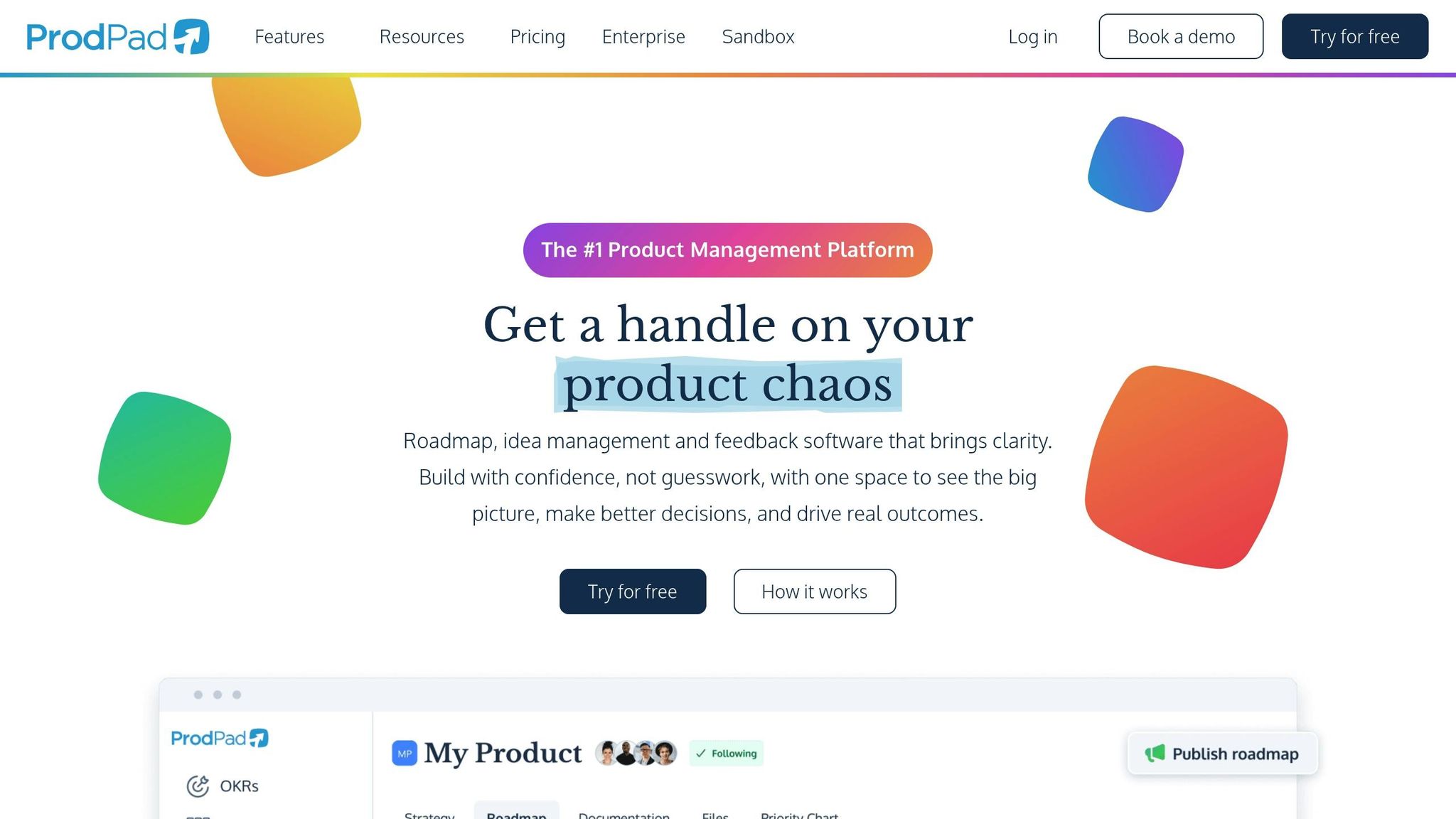
As we continue exploring AI tools for product management, ProdPad CoPilot stands out for its ability to streamline workflows and provide targeted insights. Built with a product management–focused AI model, CoPilot taps into your ProdPad data to deliver tailored recommendations and automation, helping product managers work smarter and faster.
AI-Powered Insights for Product Strategy
CoPilot acts as a strategic partner, offering guidance to help product managers shape their vision. It suggests roadmap initiatives that align with your goals and provides creative solutions to specific challenges. One of its standout features is its ability to evaluate new ideas for strategic alignment, ensuring proposed initiatives fit seamlessly into your broader objectives.
Simon Cast, CTO and Co-Founder of ProdPad, highlighted the role of generative AI in bringing their long-held vision to life:
"We had to wait for the technology to catch up to our vision of making Product Managers' lives easier. Generative AI was the leap that has helped us realize the vision we first articulated many years ago."
He also emphasized the extensive preparation that underpins CoPilot's capabilities:
"We have spent many thousands of hours setting the stage for CoPilot. Feeding the model with carefully chosen sources of best practice knowledge, adding more and more detail to the system instructions to make sure CoPilot has a rock solid foundational context that means it always answers from a 'Product' perspective."
These insights transition effortlessly into actionable automation, making it easier for teams to execute their strategies.
Automation of Workflows and Processes
CoPilot takes over time-consuming tasks, freeing up product managers to focus on more impactful work. It automates everything from drafting documentation and refining backlogs to organizing workflows and analyzing customer feedback. It can even transform spreadsheets or slide decks into dynamic roadmaps directly within ProdPad.
Additionally, CoPilot enhances team collaboration by speeding up onboarding for new teammates, answering stakeholder queries, and offering best practice coaching. So far, ProdPad's AI has delivered impressive results, including:
- Over 11,000 idea descriptions generated
- 5,000 roadmap initiatives created
- More than 6,000 ideas linked to feedback
- Summarization of 2,500+ pieces of feedback
- Creation of 2,500 user stories for customers
Pricing Transparency and Scalability
ProdPad complements its robust features with a straightforward pricing model designed to accommodate teams of all sizes. Its module-based pricing allows teams to pick and pay for only the features they need. For example, Roadmaps Essentials is priced at $24 per editor per month, while Roadmaps Advanced costs $44 per editor per month, both billed annually. Similar pricing tiers are available for Ideas and Feedback modules, and all plans include free, unlimited reviewer access. Best of all, CoPilot is included at no additional cost with every ProdPad plan.
Tool Comparison Chart
Here's a quick overview of some top AI tools for product managers. This chart highlights their features, pricing, ideal use cases, and limitations, helping you make an informed choice.
| Tool | Key Features | Pricing | Best For | Primary Limitations |
|---|---|---|---|---|
| BuildBetter.ai | AI-powered call recording, B2B qualitative analysis, integrates internal/external data, 100+ integrations, research-grade documentation | Starter – $7.99/month; Growing – $200/month; Scaling – $800/month; Enterprise – Custom | Teams needing thorough internal and external data analysis | Overage fees and limited minutes in lower tiers |
| H2O.ai | AutoML platform, machine learning model deployment, predictive capabilities, enterprise-grade scalability | Contact Sales (enterprise pricing) | Large teams needing advanced ML tools | Steep learning curve, requires technical expertise |
| Dovetail | User research repository, feedback synthesis, pattern recognition, collaborative analysis | Contact Sales (pricing upon request) | Research-focused teams managing qualitative data | Limited automation, mostly manual analysis |
| Productboard AI | Roadmap prioritization, feature scoring, stakeholder alignment, strategic planning automation | Essentials – $20/month per user; Pro – $60/month per user; Scale – $100/month per user; Enterprise – Custom | Teams focused on roadmap management and prioritization | Higher per-user costs, limited research tools |
| Zeda.io | Product discovery, customer feedback analysis, outcome tracking, revenue impact measurement | Basic – $59/month; Professional – $99/month; Enterprise – Custom | Teams connecting product decisions to business outcomes | Smaller feature set compared to broader platforms |
| ProdPad CoPilot | AI coaching, workflow automation, strategic alignment evaluation, documentation generation | Plans start at $6/month per user (CoPilot included free) | Teams seeking AI-guided product management tools | Requires an existing ProdPad ecosystem for full features |
Recommendations Based on Team Size
When choosing a tool, your team size can significantly influence the best option for your needs and budget. Here's a breakdown:
- Small teams (1–5 people): BuildBetter.ai's Starter plan at $7.99/month is a standout option, offering unlimited seats at a low cost. Similarly, ProdPad's entry-level pricing keeps expenses manageable with no escalating per-user fees.
- Mid-size teams (6–20 people): BuildBetter.ai's Growing plan at $200/month is a great fit for teams needing comprehensive data analysis, thanks to unlimited reports and workflows. For roadmap management, Productboard's Pro tier at $60 per user/month is another strong contender.
- Enterprise teams: H2O.ai is ideal for large organizations requiring advanced machine learning tools, while BuildBetter.ai's Scaling plan offers robust data processing capabilities. Keep in mind, H2O.ai may require more technical expertise to implement effectively.
For budget-conscious teams, ProdPad CoPilot is an appealing choice, as its AI-driven guidance is included at no extra cost, ensuring you get solid product management support without stretching your budget.
Different pricing models - flat-rate team plans or per-user fees - mean you should also consider your team’s growth trajectory to manage future costs effectively.
Final Thoughts
AI tools are reshaping the way product managers tackle their biggest challenges. From sifting through mountains of customer feedback to making critical decisions under tight deadlines, these tools step in to handle the heavy lifting. By automating repetitive tasks, speeding up data analysis, and supporting smarter decision-making, they’re helping teams achieve measurable improvements in efficiency, processing speed, and overall strategic alignment. This means product managers can redirect their energy toward high-value, strategic work.
One of the biggest advantages AI offers is its ability to process data at lightning speed. For example, tasks like analyzing thousands of customer comments - something that might take hours or even days manually - can now be completed in minutes. These tools can categorize feedback, detect sentiment, and highlight trends that could easily be overlooked without them. This shift allows product managers to spend less time buried in data and more time focusing on creative problem-solving and long-term planning.
Of course, the real key to unlocking these benefits lies in choosing the right tool for your needs. As highlighted earlier, factors like integration and scalability are just as important as the tool’s core features. Smaller teams may prioritize affordable options with unlimited user access, while larger organizations might require enterprise-grade solutions with advanced machine learning capabilities. The best tools are those that fit seamlessly into your existing workflow, enhancing it rather than complicating it.
AI doesn’t replace human judgment - it amplifies it. The most effective product managers combine these tools with their own strategic insights and a deep understanding of their customers. As AI technology continues to advance, the divide between those who embrace it and those who don’t will only grow wider.
The first step is to pinpoint your operational bottlenecks and experiment with tools designed to address them. Whether it’s streamlining customer feedback analysis, automating routine tasks, or extracting richer insights from user research, AI tools are proving their ability to drive product success. By freeing up time for the work that truly matters, they enable product managers to focus on making a real impact.
FAQs
How can AI tools like BuildBetter.ai help product managers make better decisions?
AI tools such as BuildBetter.ai give product managers the ability to make quicker, well-informed decisions by simplifying complex data into straightforward, actionable insights. By diving into internal communications and customer feedback, BuildBetter.ai uncovers patterns, crafts user stories, and ranks feature ideas, ensuring teams concentrate on what truly matters.
This efficient, data-focused method minimizes uncertainty, speeds up decision-making, and keeps product strategies in sync with customer expectations. With AI in their toolkit, product managers can lead with confidence and deliver results that resonate.
What should product teams look for in an AI tool to improve customer feedback management and product strategy?
When picking an AI tool, product teams should zero in on features that make customer feedback analysis easier, help with data-driven decision-making, and fit seamlessly into current workflows. The best tools should deliver practical insights, handle repetitive tasks automatically, and grow alongside your team’s changing requirements.
It’s also important to choose solutions that deepen customer understanding while matching your team’s unique goals and technical setup. The right tool can simplify operations, improve strategic planning, and ultimately lead to stronger product results.
Can AI tools fully replace manual data analysis for product managers, or are they better used alongside human expertise?
AI tools work best when they support human expertise in product management. These tools shine at automating routine tasks, crunching massive datasets, and spotting patterns. But they fall short when it comes to the nuanced understanding and contextual decision-making that seasoned product managers provide.
When product managers pair AI with their own insights, they can simplify workflows, make better decisions, and concentrate on higher-level strategies. Instead of eliminating manual analysis, AI helps boost efficiency, allowing teams to focus on working smarter.